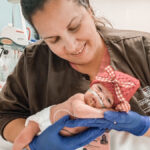A record-breaking 112.5 million people – more than a third of all Americans – are expected to travel this holiday season, including 102 million who will take their trips by car. Nothing ruins a long-awaited vacation faster than getting sick or being in medical distress. We turned to Dr. Niket Sonpal, an NYC internist and gastroenterologist for some tips on how to avoid health consequences will traveling.
Avoid Deep Vein Thrombosis
Deep vein Thrombosis (DVT) occurs when a blood clot (thrombus) forms in one or more of the deep veins in your body, usually in your legs. Deep vein thrombosis can cause leg pain or swelling, but also can occur with no symptoms. For travelers, this can happen on long haul trips where you are not moving. Dr. Sonpal recommends moving around the cabin to get the blood flowing in your legs when traveling by train or plane. If driving, take a break at a rest stop and walk around. Womens/mens compression socks are also another option to prevent DVT.
Don’t Get Nauseous
People can experience motion sickness on virtually any mode of transportation. To combat this, Dr. Sonpal suggests Dramamine Non-Drowsy Naturals, Dramamine’s first non-drowsy formulation. It contains the clinically tested ginger dosage required for preventing and treating motion sickness. Other sources of ginger, including candies, gums, or ginger ale, may not contain a full clinical dose. For someone who is already experiencing nausea while traveling, it is a good idea to keep Emetrol on hand which is an over the counter nausea medication that does not cause drowsiness.
Avoid Bloating on a Plane
If you get gassy on a plane, you’re not alone! Dr. Sonpal explains, “As the pressure around you decreases, the gas in your belly isn’t constrained as much and it expands. This can make you feel bloated or become distended.” It is essential to avoid foods that cause gas or have salt. Skip the tomato juice in flight and stick with non-carbonated water. Avoid alcohol, cruciferous vegetables, dairy and high sodium snacks such as salted peanuts or pretzels. Foods that are protein packed, magnesium-rich and high in Vitamin C are good options.
Sanitize Your Surfaces
Planes and trains are a breeding ground for illness. The former are awful due to re-circulated air. Most travelers would be appalled if they really knew how germy their tray tables are! Dr. Sonpal suggests sanitizing wipes for your tray table, seat belt clip and hand rests of your seats on planes and trains. When you exit a restroom on a plane or train and touch the door handles, be sure to use hand sanitizer even if you already washed your hands.
Get Your Shots Before Traveling Abroad!
Before you book your trip, make sure you’re up to date on your shots. If you’re traveling to an area where you’re at risk for picking up an illness like malaria, you might be prescribed preventative medication. Dr. Sonpal suggests that, “People should use the CDC website for recommended vaccines for travel abroad or see a travel clinic. The health risks posed to Americans vary based on the country they are traveling to.”
Avoid Jet Lag
Even a relatively short time change from EST to PST (3 hours) can cause jet lag. With some international travel from the United States, the time difference can be as much as twelve hours. If you’re traveling east, try going to bed one hour earlier each night for a few days before your departure. Go to bed one hour later for several nights if you’re flying west. If possible, eat meals closer to the time you’ll be eating them at your destination. Dr. Sonpal suggests that you set your watch to the new time before you leave. Once you reach your destination, try not to sleep until the local nighttime, no matter how tired you are.













 Deering Estate
Deering Estate
 Massage Envy South Miami
Massage Envy South Miami
 Calla Blow Dry
Calla Blow Dry
 My Derma Clinic
My Derma Clinic
 Sushi Maki
Sushi Maki
 Sports Grill
Sports Grill
 The Healthy Kitchen
The Healthy Kitchen
 Golden Rule Seafood
Golden Rule Seafood
 Malanga Cuban Café
Malanga Cuban Café

 Kathleen Ballard
Kathleen Ballard
 Panter, Panter & Sampedro
Panter, Panter & Sampedro
 Vintage Liquors
Vintage Liquors
 The Dog from Ipanema
The Dog from Ipanema
 Rubinstein Family Chiropractic
Rubinstein Family Chiropractic
 Your Pet’s Best
Your Pet’s Best
 Indigo Republic
Indigo Republic




 ATR Luxury Homes
ATR Luxury Homes


 2112 Design Studio
2112 Design Studio
 Hamilton Fox & Company
Hamilton Fox & Company
 Creative Design Services
Creative Design Services
 Best Pest Professionals
Best Pest Professionals
 HD Tree Services
HD Tree Services
 Trinity Air Conditioning Company
Trinity Air Conditioning Company
 Cisca Construction & Development
Cisca Construction & Development
 Mosquito Joe
Mosquito Joe
 Cutler Bay Solar Solutions
Cutler Bay Solar Solutions


 Miami Royal Ballet & Dance
Miami Royal Ballet & Dance
 Christopher Columbus
Christopher Columbus
 Pineview Preschools
Pineview Preschools
 Westminster
Westminster
 Carrollton
Carrollton
 Lil’ Jungle
Lil’ Jungle
 Frost Science Museum
Frost Science Museum
 Palmer Trinity School
Palmer Trinity School
 South Florida Music
South Florida Music
 Pinecrest Orthodontics
Pinecrest Orthodontics
 Dr. Bob Pediatric Dentist
Dr. Bob Pediatric Dentist
 d.pediatrics
d.pediatrics
 South Miami Women’s Health
South Miami Women’s Health

 The Spot Barbershop
The Spot Barbershop
 My Derma Clinic
My Derma Clinic




 Miami Dance Project
Miami Dance Project

 Rubinstein Family Chiropractic
Rubinstein Family Chiropractic
 Indigo Republic
Indigo Republic

 Safes Universe
Safes Universe
 Vintage Liquors
Vintage Liquors
 Evenings Delight
Evenings Delight





 Atchana’s Homegrown Thai
Atchana’s Homegrown Thai
 Baptist Health South Florida
Baptist Health South Florida

 Laser Eye Center of Miami
Laser Eye Center of Miami
 Visiting Angels
Visiting Angels
 OpusCare of South Florida
OpusCare of South Florida

 Your Pet’s Best
Your Pet’s Best





 HD Tree Services
HD Tree Services
 Hamilton Fox & Company
Hamilton Fox & Company


 Creative Design Services
Creative Design Services